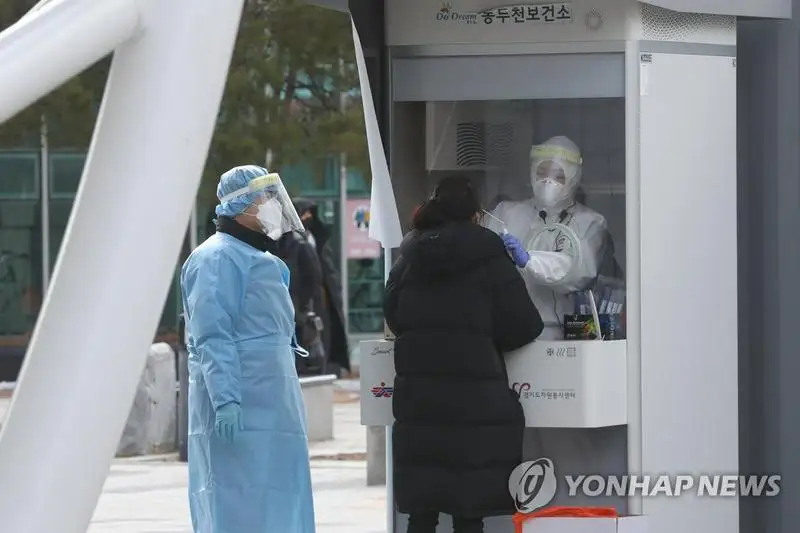New virus cases hovering around 400, potential upticks worrisome amid pandemic fatigue in S. Korea

The country reported 398 more COVID-19 cases, including 381 local infections, raising the total caseload to 91,638, the Korea Disease Control and Prevention Agency (KDCA) said.
The daily caseload was down from 444 cases recorded Wednesday and 424 cases Thursday.
The country added eight more deaths from COVID-19, raising the total to 1,627. The fatality rate was 1.78 percent.
South Korea reported more than 1,000 daily cases in late December before it saw a downward trend. The daily tally has been largely stagnant recently, staying around 300 and 400.
The country has administered vaccinations to a total of 225,853 people since launching a mass vaccination campaign last Friday, with an additional 67,153 getting the shots Thursday, according to the KDCA.

AstraZeneca's vaccine accounted for 221,944, while Pfizer's took up 3,909.
The vaccination campaign is expected to pick up pace as more people in COVID-19 vaccination priority groups, including medical workers and patients at nursing homes, get the shots. The country aims to achieve herd immunity by November.
A total of 1,578 cases of side effects after vaccinations has been reported so far, up 860 from a day earlier, although 1,558 of them were mild symptoms.
An additional six suspected cases of anaphylactoid reaction, which has similar symptoms to anaphylaxis, a serious allergic reaction after immunization, have been reported, raising the total of such cases to 13.
Health authorities are looking into six cases of deaths reported after vaccinations, adding that a potential causal relationship between the vaccinations and the deaths will be investigated.
Amid the vaccination push, health authorities are still worrying about a potential uptick in new cases in spring as citizens, weary of year-long virus curbs, may have more contact with one another.
Although concerns of cluster infections persist, health authorities said they will allow visitations to nursing homes if visitors wear protective gear and have tested negative for the virus.
«People's movements are increasing after the Lunar New Year holidays,» Yoon Tae-ho, a senior health official, said. «We are seeing stagnation in new virus cases, but we cannot rule out the possiblity that infections can surge again.»
Health authorities are also closely monitoring the spread of more contagious COVID-19 variants. As of Thursday, the country had confirmed 162 such cases since confirming the first variant case in October, with six of them being identified this week.
Of them, 138 were the Britain variant, followed by the South African strain with 18 and the Brazilian strain with six.
To stem the further spread of the new coronavirus, the country extended its social distancing rules, including bans on private gatherings of five or people, through March 14.
Health authorities will unveil a draft of a new social distancing scheme later in the day and hold a public hearing before finalizing it by the end of the month.
The country has been using a five-tier social distancing system since November. Previously, it implemented a three-level system.
The greater Seoul area, home to about half of the nation's 52 million population, is currently under Level 2, the third highest in its five-tier system, and other regions are placed under Level 1.5.
Of the new locally transmitted cases, 129 additional cases were reported in Seoul and 168 in Gyeonggi Province that surrounds the capital. Incheon, 40 kilometers west of Seoul, identified 12 new cases.
There were an additional 17 imported cases, down six from a day earlier, increasing the total caseload to 7,146. Of the new imported cases, six were from the United States followed by the Philippines with four.
The number of seriously or critically ill COVID-19 patients was 135, down five from the previous day.
The total number of people released from quarantine after making full recoveries was 82,560, up 398 from a day earlier, with 7,451 people being isolated for COVID-19 treatment, down eight from a day ago.
South Korea has carried out 6,789,011 COVID-19 tests, including 37,111 from the previous day.